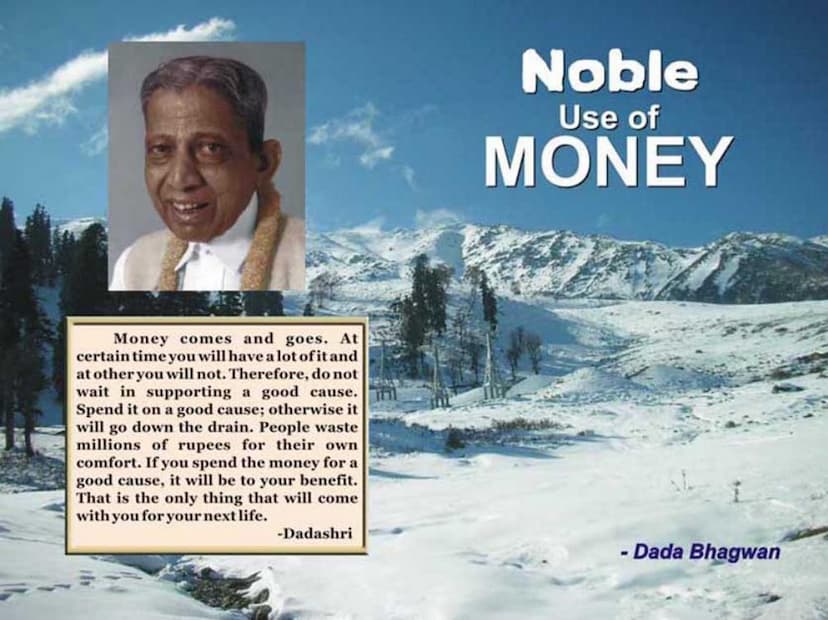Noble Use Of Money
Added to library: September 2, 2025
Loading image...

Summary
Here's a comprehensive summary of Dada Bhagwan's "Noble Use of Money," based on the provided text:
Core Message: The fundamental message of "Noble Use of Money" is that money is transient and its true value lies in how it is used for the benefit of others and spiritual progress. The book emphasizes that while money may come and go, what is spent on a "good cause" is what ultimately benefits one in this life and the next.
Key Themes and Teachings:
- Money's Fleeting Nature: Dada Bhagwan repeatedly states that money "comes and goes." It is not permanent, and attachment to it can lead to suffering.
- The Importance of "Good Causes": The primary directive is to channel money towards beneficial endeavors. This diverts it from going "down the drain" or being wasted on fleeting comforts and ego-driven desires.
- Charity (Daan) as the Path to Merit: Giving to others, or charity, is presented as the most effective way to accumulate merit karma (punya) for future lives. The book delves into various forms and principles of charity.
- Types of Charity:
- Food (Ahara-daan): Giving food to the hungry.
- Medical Help (Aushadha-daan): Providing medicine or medical care. This is considered more valuable than food charity as it can extend life and alleviate suffering.
- Spiritual Knowledge (Gnandaan): The most highly valued form of charity. This includes supporting the printing and distribution of spiritual books and knowledge that guide people towards liberation.
- State of Absolute Non-Violence (Abhayadaan): Living in a way that does not cause fear or harm to any living being. This is considered the ultimate charity, though it requires extraordinary spiritual development and does not directly involve money.
- The Intent Behind Charity (Bhaav): The internal intention behind a donation is paramount. Pure intentions, devoid of ego, fame, or expectation of return, lead to the greatest benefits. Giving with a sincere desire to help, even if one's financial means are limited, creates merit karma for the next life.
- Avoiding Fame and Prestige: Donations made for recognition, fame, or to have one's name on plaques are considered detrimental. Such actions exhaust the merits in the current life, offering no lasting benefit for the future. True donors give anonymously.
- "Money of This Era": Dada Bhagwan notes that money in the current time cycle is often associated with demerit karma. Therefore, managing money requires increased awareness and careful channeling towards good causes.
- The Role of "Mahatmas": Serving and supporting "Mahatmas" (those who have attained Self-realization and live by Dada's principles) is considered the highest form of service and charity, as their sole focus is the spiritual welfare of others.
- Serving Lord Simandhar Swami: Donating towards the temples and propagation of the teachings of Lord Simandhar Swami (the current living Tirthankara in Mahavideh Kshetra) is emphasized as the highest path to merit karma that leads to liberation (moksha).
- Generosity and Inner Intent: True wealth and generosity are not about the amount given but the willingness and purity of the intent. Those who are truly generous continue to give even when they have little, and their wealth often increases.
- Responsibility Towards Children: While providing for children is natural, excessive luxury can be detrimental to their spiritual progress. Parents should educate and prepare their children for self-sufficiency, giving them only what is necessary and not enabling dependency.
- The Importance of "Samyak Intellect": The book stresses the need for "samyak intellect" (right understanding), which can be attained by meeting a Gnani Purush (Self-realized being). This understanding guides one in making noble choices with money and life.
- The Cycle of Karma: Money received is a result of past merit karma. How it is spent in the present life determines the karmic consequences for the future. Spending on oneself is considered "down the drain," while spending for others creates future benefits.
- Money and Violence (Hinsa): Hoarding money, not compensating workers adequately, or acquiring wealth through dishonest means are considered forms of violence.
- "Black Money" and Donations: While ideally money should be honest, Dada Bhagwan suggests that even "black money" or undeclared money, when used for a genuinely charitable or religious cause, can lessen the donor's liabilities and create some merit karma, though the purity of intent remains crucial.
- Not Soliciting Money: The teachings emphasize not asking for donations but accepting them willingly from those who understand and wish to give, particularly for Gnan-daan and the work of the Gnani Purush.
In essence, "Noble Use of Money" is a practical guide to spiritual finance. It encourages a shift from materialistic attachment to a charitable and inwardly motivated approach to wealth, leading to both worldly well-being and spiritual liberation.